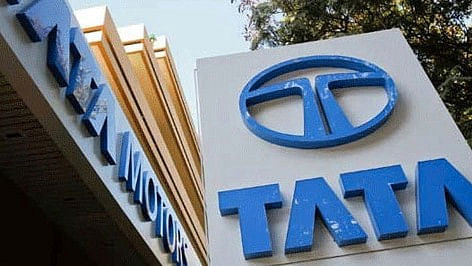
The logo of Tata Motors.
Credit: Reuters File Photo
New Delhi: India's top electric vehicle maker, Tata Motors, is luring consumers with free charging and steep discounts, while rival MG Motor has launched its first battery rental plan, in strategies aimed at propping up sales of the clean cars.
Use of electric vehicles (EVs) has grown rapidly in recent years to account for 2 per cent of India's annual sales of 4.2 million cars, but sales growth is now faltering, which analysts blame on high prices and lack of charging facilities.
"We want to make electric vehicles affordable," Satinder Singh Bajwa, chief commercial officer of MG Motor, said at an event to launch the firm's new EV with a battery rental service, the world's first of its kind.
"You are paying for the usage of the battery as you pay for the fuel," Bajwa added, as the firm, a joint venture of India's JSW Group and China's SAIC, attempts to make one of the cars' most expensive components affordable for buyers.
The "Battery-as-a-Service" plan will effectively cost 3.5 rupees (4 US cents) a km, though customers will need to pay for a monthly minimum of 1,500 km (932 miles) in the scramble to ensure a low initial acquisition cost.
That kind of effort is sorely needed.
For example, India's biggest EV maker, Tata Motors sold just 4,086 EVs in August, down nearly 15 per cent from a year earlier, in a fourth successive month of annual decline in the world's third-largest auto market.
To capitalise on the festive season, when consumers step up purchases, Tata said this week it was cutting prices by about 10 per cent to 20 per cent on its Punch and Nexon models, while offering six months of free charging at 5,500 stations run by its power unit.
The price cuts and other offers were a "step towards mainstreaming EVs and accelerating EV adoption," the company said in a statement.
In particular, they bring the cost of its best-selling Nexon to about $15,000, on par with its gasoline or diesel variants.
Indians prefer gasoline and diesel vehicles as charging stations are far and few between, despite a government push to boost sales of clean cars.
While sales of e-scooters have rocketed, fuelled by high demand from e-commerce companies, annual sales of electric cars still languish at fewer than 1,00,000.
That has not deterred the likes of MG Motor, BYD , BMW and Mercedes-Benz from launching their versions, many priced to attract the growing numbers of India's rich and affluent.
MG Motor is targeting more buyers with this week's launch of its Windsor EV, at a cost of 999,000 rupees ($11,900).
Features include a panoramic glass roof, reclining rear seats, six airbags and free charging at many stations for a year.